|
|
|
Sort Order |
|
|
|
Items / Page
|
|
|
|
|
|
|
| Srl | Item |
| 1 |
ID:
080306
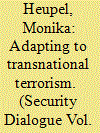

|
|
|
|
|
| Publication |
2007.
|
| Summary/Abstract |
During the 1990s, and particularly since 9/11, state-sponsored terrorism gradually declined, while transnational terrorism, which largely operates without direct state support and features cross-border network structures and a greater propensity to mass-casualty attacks, has gained in importance. Setting out from this observation, the purpose of this article is to examine whether the UN Security Council (SC) has adapted to transnational terrorism and, if so, how. Providing a systematic and theory-guided comparison of the SC's approach to these different types of terrorism, the article shows that, contrary to common considerations, the SC did adapt to transnational terrorism. The SC applied sanctions against terrorists and committed every state to instituting far-reaching generic counter-terrorism measures. Moreover, in an unprecedented way, it made use of managerial compliance strategies to foster implementation. In this way, the SC adapted to transnational terrorism by demanding more from states and intervening deeper into their domestic realm, while at the same time offering more support with respect to implementation. While such an approach is unlikely to become common SC practice in the short term, it is nevertheless symptomatic of a broader trend in the evolution of governance patterns in the post-national constellation today
|
|
|
|
|
|
|
|
|
|
|
|
|
|
|
|
| 2 |
ID:
080899
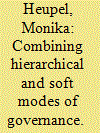

|
|
|
|
|
| Publication |
2008.
|
| Summary/Abstract |
In the wake of 9/11, the UN Security Council (SC) set out to urge every UN member to strengthen its domestic capacity to counter transnational terrorism and the heightened risk of weapons of mass destruction (WMD) proliferation to non-state actors. This article examines the modes of governance the SC applied - in terms of both setting and implementing rules - to influence states' activities in response to these two security threats. The far-reaching, generic, legally binding obligations imposed on every UN member were unprecedented and indicate a `hierarchical' approach. Yet, the SC - partly deliberately, and partly out of necessity - drew extensively upon a range of `soft' governance modes to support implementation and enhance the legitimacy of its approach. It remains to be seen whether this approach will be the precursor to a future trend. However, its usefulness will depend on whether the SC members will come to an agreement on how to implement `legislative' resolutions, and whether non-Council members will be granted greater influence in SC decision-making. Although more empirical research is needed on the SC's application of different modes of governance, these results contribute to a better understanding of the use of governance modes by international organizations other than the European Union
|
|
|
|
|
|
|
|
|
|
|
|
|
|
|
|
| 3 |
ID:
158727
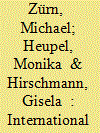

|
|
|
|
|
| Summary/Abstract |
Human rights violations by international organisations (IOs) are a possible side effect of their growing authority. Recent examples are the cases of sexual exploitation by UN peacekeepers and violations caused by IMF austerity measures. In response, IOs increasingly develop safeguards to protect human rights from being violated through their policies to regain legitimacy. We argue that this development can be accounted for by a mechanism we call ‘authority-legitimation mechanism’. We test this theoretical expectation against ten case studies on UN and EU sanctions policies, UN and NATO peacekeeping and World Bank and IMF lending. Next, we demonstrate inductively that the authority-legitimation mechanism can evolve through different pathways, depending on which actors get engaged. We label these pathways legislative institution-building if parliaments in member states put pressure on their governments to campaign for human rights safeguards in IOs, judicial institution-building if courts demand human rights safeguards, like-minded institution-building if civil society organisations, middle powers and IO bodies with little formal power push for human rights safeguards, or anticipatory institution-building if IOs adopt such safeguards from other IOs without having violated human rights themselves. Finally, we argue that which of these pathways are activated and how effective they are depends on specific conditions.
|
|
|
|
|
|
|
|
|
|
|
|
|
|
|
|
| 4 |
ID:
178965
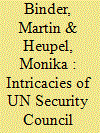

|
|
|
|
|
| Summary/Abstract |
The only way forward would be a grand bargain under which actors holding maximalist positions gave them up and agreed to a ‘reforms lite’ compromise.
|
|
|
|
|
|
|
|
|
|
|
|
|
|
|
|
| 5 |
ID:
139526
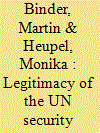

|
|
|
|
|
| Summary/Abstract |
Existing research on the legitimacy of the UN Security Council is conceptual or theoretical, for the most part, as scholars tend to make legitimacy assessments with reference to objective standards. Whether UN member states perceive the Security Council as legitimate or illegitimate has yet to be investigated systematically; nor do we know whether states care primarily about the Council's compliance with its legal mandate, its procedures, or its effectiveness. To address this gap, our article analyzes evaluative statements made by states in UN General Assembly debates on the Security Council, for the period 1991–2009. In making such statements, states confer legitimacy on the Council or withhold legitimacy from it. We conclude the following: First, the Security Council suffers from a legitimacy deficit because negative evaluations of the Council by UN member states far outweigh positive ones. Nevertheless, the Council does not find itself in an intractable legitimacy crisis because it still enjoys a rudimentary degree of legitimacy. Second, the Council's legitimacy deficit results primarily from states' concerns regarding the body's procedural shortcomings. Misgivings as regards shortcomings in performance rank second. Whether or not the Council complies with its legal mandate has failed to attract much attention at all.
|
|
|
|
|
|
|
|
|
|
|
|
|
|
|
|
| 6 |
ID:
086950
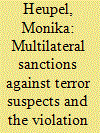

|
|
|
|
|
| Publication |
2009.
|
| Summary/Abstract |
The UN and EU sanctions regimes against suspected terrorists at first clearly violated commonly accepted due process standards. Both organizations gradually reformed the procedures that regulated which individuals and entities were subject to sanctions, yet the UN procedures in particular still evince important shortcomings. While international law scholars have debated how the sanctions regimes must be designed to be consistent with international law, political science scholars have, as yet, largely held back from looking into why the regimes evolved in the way they did. This article suggests that court decisions and proceedings and, in the case of the UN, falling commitment from member states, have prompted the UN Security Council and the Council of the EU to implement limited reforms. However, courts did not challenge the sanctions regimes per se and there was no substantial pressure from civil society actors. Moreover, owing to the competences and working methods of the UN Security Council and the Council of the EU, powerful member states could fairly easily deflect reform proposals from disaffected states and other UN and EU bodies.
|
|
|
|
|
|
|
|
|
|
|
|
|
|
|
|
| 7 |
ID:
080632
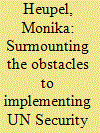

|
|
|
|
|
| Publication |
2008.
|
| Summary/Abstract |
UN Security Council Resolution 1540, which binds all states to implement generic nonproliferation obligations, has been hampered in its effectiveness by serious delays and problems in implementing its obligations. Getting nations to carry out its requirements depends on applying a division of labor strategy to the problem. Such a strategy would be based on the Security Council's 1540 Committee and other participants - such as international and regional organizations, regimes, state actors, and nongovernmental organizations (NGOs) - all working together to maximize their competences toward applying the resolution. To create and maintain momentum, those involved must improve their efforts to address the various challenges to such implementation. The Security Council should strengthen the structural foundation of the 1540 Committee, and the 1540 Committee should act as a clearinghouse for assistance with implementing the resolution. Those bodies that provide assistance should make more help available to more states and cooperate closely with the 1540 Committee. NGOs and regional organizations should pressure advanced states to fulfill the resolution's requirements with the necessary urgency, and individual states and international organizations should explore ways to accommodate frequently articulated grievances that dilute the legitimacy of Resolution 1540.
|
|
|
|
|
|
|
|
|
|
|
|
|
|
|
|
|
|
|
|
|